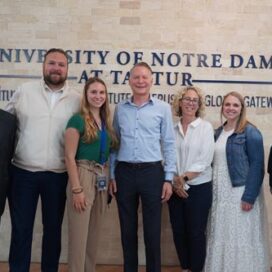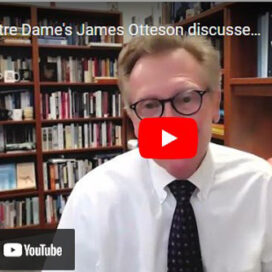The Secrets of Giving and Receiving Thanks at Work: Why Followers Love it and Leaders Hesitate to Accept it
Published: December 19, 2016 / Author: Christopher Adkins

Note: This column was published originally on the ND Deloitte Center for Ethical Leadership website.
What if you could increase your employees’ productivity by 50 percent just by expressing gratitude?
That’s exactly what happened in one public university, according to a 2010 study. Without changing her fundraisers’ work situations or compensation structures, one fundraising director simply told her team, “I am very grateful for your hard work. We sincerely appreciate your contributions to the university.” The week after they received this thanks, the fundraisers made 50 percent more calls than the week before.
In other words, for those often deprived of thanks, a small amount gratitude means a lot. Yet Gino and Grant replicated similar results with other groups. They found that expressions of gratitude could both initiate and sustain a wide variety of what researchers call “prosocial behaviors,” behaviors like sharing, helping, volunteering and cooperating with team members.The researchers behind this study, Francesca Gino and Adam Grant, chose to study fundraisers because “fundraising is often a thankless job that triggers rude feedback and regular rejections … [thus] gratitude expressions in this realm are likely to be memorable and salient.”
Why does gratitude lead to an increase in these positive behaviors? The studies conducted by Grant and Gino suggest that being thanked increases our feeling of social worth. As others recognize the value of our work, we are willing to contribute more of our time, energy and skill.
These findings affirm something philosophers suggested long ago: Gratitude enables ethical actions. As the Roman philosopher and orator Marcus Tullius Cicero put it in the first century BC, “Gratitude is not only the greatest of virtues, but the parent of all the others.” For this reason, psychologists consider gratitude to be a moral emotion — not because it is moral in and of itself, but because it can enable moral behaviors, such as sharing and collaboration.
We all want to be appreciated at work, so what happens when followers show appreciation to their leader?
A 2012 study by M. Ena Inesi, Deborah H. Gruenfeld, and Adam D. Galinsky found that the difference in power—or things that stand in for power, like money—gives leaders a number of reasons to doubt their subordinates’ motives when showing kindness or appreciation. In other words, leaders can easily become cynical and believe that their followers only behave kindly toward them because they want access to power and the benefits that come with it.
Whether you are a leader or follower—or both—you can improve your effectiveness in giving and receiving gratitude. Here are some best practices from the research on the power of gratitude:
Schedule a specific time every day to reflect with gratitude.
As trite as it may sound, the time-honored practice of counting your blessings every day has support from numerous studies (Emmons & McCullough, 2003; Lyubomirsky et al., 2005; Seligman et al., 2005). Psychologists suggest practices like keeping a gratitude journal or mentally subtracting positive events in your life to imagine what life would be like without them (Koo et al., 2008).
Express gratitude.
One of the most powerful ways to experience gratitude is simply to start expressing it. In a 2005 study, Martin Seligman and his colleagues found that writing a letter to express gratitude and delivering the letter in person could increase gratitude and the positive emotions that go along with it for more than a month.
Give your followers the benefit of the doubt.
A 2014 study found that participants experienced gratitude more when they recognized the free will of others (MacKenzie, et al.). Remember that your subordinates may have less power than you have, but they still have choices and options. If they go above and beyond, do not assume they do so to experience personal gain and to avoid punishment. If you choose to be grateful, you have little to lose if you are wrong, and you have many benefits to gain if you are right.
The important thing to remember about gratitude is that it is reciprocal: it is good both for the person who receives it and for the person who expresses it (Bolino & Grant, 2016). For this reason, a little gratitude goes a long way, reaping benefits in performance, engagement and wellbeing both for yourself and for your team.
About the author:
Christopher Adkins is associate teaching professor in the Department of Management & Organization and the executive director of the Notre Dame Deloitte Center of Ethical Leadership at the University of Notre Dame’s Mendoza College of Business. Adkins’ research and teaching explore how the fields of neuroscience, psychology, philosophy and behavioral economics provide new insights and best practices for values-based leadership. Empathy is the core theme of his work, offering a foundational and teachable skill to enhance innovation, communication, diversity and inclusion, ethical decision making, and change leadership. In June 2015, he was awarded Master Teacher of Business Ethics by the Wheatley Institution at Brigham Young University.
In addition to his teaching and research, Adkins designs engaging leadership programs based on the neuroscience of individual and organizational flourishing. Partners and clients have included: World Bank, Saatchi & Saatchi, Deloitte, Aspen Institute, IBM, Conference Board, Navigant Consulting, Education First, Giving Voice to Values, Corporate Eco Forum, Huntington Ingalls Industries, Agilent Technology, Novelis.
Further Reading:
Bolino, M. C., & Grant, A. M. (2016). The Bright Side of Being Prosocial at Work, and the Dark Side, Too: A Review and Agenda for Research on Other-Oriented Motives, Behavior, and Impact in Organizations. The Academy of Management Annals, 1-72.
Emmons, R. A., & McCullough, M. E. (2003). Counting Blessings Versus Burdens: An Experimental Investigation of Gratitude and Subjective Well-being in Daily Life. Journal of Personality and Social Psychology, 84(2), 377.
Grant, A. M., & Gino, F. (2010). A Little Thanks Goes a Long Way: Explaining Why Gratitude Expressions Motivate Prosocial Behavior. Journal of Personality and Social Psychology, 98(6), 946.
Inesi, M. E., Gruenfeld, D. H., & Galinsky, A. D. (2012). How Power Corrupts Relationships: Cynical Attributions for Others’ Generous Acts. Journal of Experimental Social Psychology, 48(4), 795-803.
Koo, M., Algoe, S. B., Wilson, T. D., & Gilbert, D. T. (2008). It’s a Wonderful Life: Mentally Subtracting Positive Events Improves People’s Affective States, Contrary to their Affective Forecasts. Journal of Personality and Social Psychology, 95(5), 1217.
Lyubomirsky, S, Sheldon, KM and Schkade, D. 2005. Pursuing happiness: The Architecture of Sustainable Change. Review of General Psychology, 9: 111–131.
MacKenzie, M. J., Vohs, K. D., & Baumeister, R. F. (2014). You Didn’t Have to Do That Belief in Free Will Promotes Gratitude. Personality and Social Psychology Bulletin, 40(11):1423-34.
Seligman, M. E., Steen, T. A., Park, N., & Peterson, C. (2005). Positive Psychology Progress: Empirical Validation of Interventions. American Psychologist, 60(5), 410.
Related Stories




